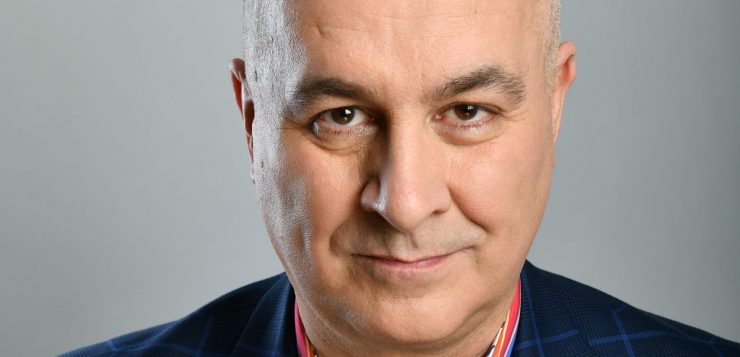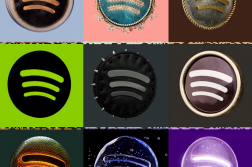Iain Dale is a prominent political commentator, publisher, author and the award-winning host of LBC’s primetime weekday slot.
With decades of experience in the world of British politics, he is respected across the political divide and is a trusted voice of reason on politics and current affairs.
A few weeks ago, I sat down with Iain at LBC’s Leicester Square Studios to delve into the story behind the person and the factors behind his success.
Early life and Education
Iain and I began our conversation by discussing his childhood, where he grew up in Northwest Essex with his parents, grandmother and two sisters. He looked back on this time fondly, recalling his ‘perfect upbringing’ spent on a small family-run farm near Saffron Walden.
He gladly told stories of how his mother dedicated her days to the family whilst juggling the farm accounts, grateful for her always being around for the family. Similarly, Iain was full of admiration for his grandmother, with whom he would ‘argue like cat and dog’ but would always end up posting a note of apology later in the day.
For me, a key theme of the interview was Iain’s appreciation for his mother and grandmother and his clear adoration for these two female figures in his life.
The Dale family were brought closer as a result of growing up on the farm, with many evenings spent working, enjoying one another’s company: Iain recalled days driving the tractor and shooting sparrows, aged as young as eight, and how his father would invite his primary school friends to come and explore the farm during the holidays.
It seemed to me that Iain is immensely grateful for his childhood and, as will come up throughout this piece, can often point to a moment that led him to be where he is today.
Iain was state-educated at local primary and secondary schools in Essex, explaining his ‘refusal’ to attend private school, asking his mother, ‘Why would I want to travel 16 miles there and back… when all my friends are going to [the local comprehensive school]’. However, in hindsight, Iain talked about his slight feeling of regret that he didn’t go to private school, sometimes feeling inferior to others who did.
Secondary school is where Iain’s love of German began, having only picked it as a subject due to the influence of his grandmother. But, after a school exchange later that year, Iain recalled coming top of the class in the end-of-year exam and immediately knowing it was the subject for him.
After a year spent as a nursing assistant in Germany, Iain chose to read German and Linguistics at the University of East Anglia, where he is now a visiting professor of media and politics.
It was at university where Iain properly began to become active in politics, too, launching the University’s Conservative Association and speaking in various student debates – including many across the aisle from future Labour MP Caroline Flint.
Student politics also thrust Iain into the world of real-world politics when he began leading teams canvassing and leafleting various areas of the Norwich North constituency whilst juggling his studies.
Iain reminisced on his time at university with great fondness, explaining how it changed him as a person, allowing him to be his true self, and he marks it as the beginning of his involvement in politics.
Dale’s Introduction to National Politics and Early Careers
Following his introduction to national politics at university, Iain asked Patrick Thompson if he would give Iain a job in his office and to his surprise, the newly elected MP said yes! (If you don’t ask, you don’t get!)
I then asked Iain about his time working in parliament and the splendour of the Palace when he told me a story of how he stumbled across former Prime Minister Jim Callaghan giving former President Gerald Ford the grand tour of the British parliament in his first few weeks there.
Iain worked in Thompson’s office for around two years, always conscious that he didn’t want to become trapped in Westminster, setting a final deadline at the next election.
During his time in Westminster, Iain made friends with an intern from the US, who had invited him to visit Michigan following the 1987 General Election.
Whilst in the States, Iain sought a copy of the Sunday Times, having missed the British papers whilst he was away. It was there where he found the advert for what would be his next job, public affairs manager for the British Ports Association.
He filled out the application and, to his astonishment, got an interview – finding out later it was due to his former boss’ links to the Department of Transport.
Iain then continued a string of ‘more conventional’ jobs as a PR consultant at Charles Barker and insurance correspondent at Lloyd’s List, followed by managing director at the Waterfront Partnership (Dale’s co-owned public affairs consultancy).
It was at Lloyd’s List when Iain first realised his talent for writing, drafting a highly praised piece on the niche industry matter of reinsurance despite ‘not at all understanding what it meant’.
Iain does confess, however, that this wasn’t the first time he’d considered journalism as a potential career and that he’d looked into broadcasting after a sixth-form trip to a local TV studio in 1979.
Iain recalled a major personal setback for him at Lloyd’s List when he was the subject of a union meeting convened because the elder hacks disapproved of the hiring of someone with no journalistic experience and a background in Conservative politics.
This was rectified on the day Iain left his job over a year later, when the union representative apologised to him, explaining that he had proved himself to be an excellent journalist and worthy of the position – a huge moment of validation for Dale.
Overall, it seemed to me that Iain was overwhelmingly grateful for his experience in more mainstream positions as this provided him with solid foundations and important lessons learnt for later life.
Dale’s Rise to Prominent Publisher and Name
Dale first became known by many in Westminster as a leading political publisher and retailer, having opened Politico’s Bookstore and Coffee House in 1997.
Politico’s was based in Westminster and sold various political books, memorabilia and novelty items before Iain made the decision to launch Politico’s publishing alongside it – this commenced a publishing career that would last nearly two decades, during which Iain published over 600 books.
After Politico’s, Iain started Total Politics magazine in 2008 before re-entering publishing with Biteback in 2009, seeing a gap in the market emerge after the closure of his former publishing firm.
In 2018, after taking on various other projects on the radio and television, Iain became overrun and decided ‘something had to give’ and gave up publishing to pursue broadcasting success.
He told me how he expected to miss publishing after letting it go but, to his surprise, only missed fine aspects of the job, like the adrenaline rush of receiving a good proposal and the haste to get the author signed.
It was apparent to me that Iain loved his time as a publisher, particularly the process of shaping a bestselling title, but it was also apparent that he was content to let it go, potentially pointing to the all-consuming nature of the job.
Iain is also widely known as one of Britain’s’ first and leading political bloggers, launching Iain Dale’s Diary in 2003 and continuing to launch Dale & Co and West Ham Til’ I Die (a collaborative blog in recognition of Iain’s love of West Ham) in later years.
When Iain started, blogging was a completely new medium, and there were very few, if any, political blogs in this country – which Iain believes put him at an early advantage compared to his competitors.
Iain recalled a time when he had a better readership than the Independent newspaper and spoke about the level of snobbery that mainstream political journalists had towards bloggers before performing a full U-turn, having noticed their success and capitalising by starting their own.
Dale explained to me how his success in blogging elevated his commentary profile, enabling appearances on Sky, CNN and various radio stations nearly every day in the years after.
In addition to Iain’s blogging triumphs, he is also a seasoned author, having written or edited over 60 books on politics and more. Despite this, Iain disclosed to me that he has never fully enjoyed writing due to a sense of not being good enough, something he still feels to this day.
He explained that this feeling began when he started writing newspaper columns profiling David Cameron, expecting them to be sent back (although he pointed out that this had never happened).
In recent years, Iain has edited various compilations of essays on Prime Ministers, Presidents, General Election Campaigns and more – which he confessed he much prefers to authoring books himself.
He explained to me that one of the highlights of editing this series is matching the authors to the chapters, particularly being able to promote young authors (noting various LBC producers and up-and-coming historians in recent editions).
This is something Iain has tried to do throughout his career to allow aspiring politicos to climb up the ladder toward success.
Despite his feeling of imposter syndrome, Iain is an incredibly well-respected author and editor who, in my opinion, should be proud not only of his writing success but also of the work he has done, which has enabled so many aspiring journalists to go on to great things.
Dale on the Radio
Iain Dale is probably best known as the award-winning radio host, currently presenting the prime time 7-10pm slot on Britain’s leading speech radio station, LBC.
First entering the world of broadcasting as a stand-in for Andrew Pierce on BBC Radio 5 Live in the early noughties, Iain presented Sunday Service alongside veteran radio hosts Fi Glover and Charlie Whelan.
When he was first asked if he would like to sit in Andrew Pierce’s seat, Dale asked, ‘Is the pope a Catholic?’, leaving no doubt about his desire to take on the art of radio.
Iain laughed as he told me how he had recently listened back to his early appearances, finding he sounded much posher than he remembered, using his ‘telephone voice’ and ‘trying too hard to be funny’.
Despite enjoying his time there, Iain explained that he doesn’t think it would’ve worked for him at the BBC, had he stayed, due to the organisation’s restrictions on presenters’ views being aired.
Following several years as a regular relief presenter at the BBC, Iain found himself auditioning for LBC alongside fellow pundit and then-TV wife Yasmin Alibhai-Brown.
After a successful audition, Iain was invited to present a show during the 2009 Liberal Democrat Conference, standing in for Petrie Hosken.
This was another difficult moment for Iain when multiple rookie errors left him feeling as though he had ruined his chances of ever being asked to present radio again, let alone at LBC, with executives not getting back in contact for weeks after.
Iain later discovered that this was not due to their lack of appetite for his hosting talents but because they were unsure of his political aspirations and didn’t want to invest in him if it wouldn’t last.
When Dale made his decision to ditch ambitions for political office before the 2010 general election, he was offered a full-time presenting slot on LBC, 5 days a week, which he quickly accepted.
Since then, Iain has been recognised as Radio Presenter of the Year twice, at the 2013 and 2016 Arqiva Commercial Radio Awards, and has received the award for the Interview of the Year at the 2014 Sony Awards following his conversation with ‘James from Woolwich’ during the aftermath of the murder of Fusilier Lee Rigby.
Iain recalled being in the Global newsroom when the first rumours of an incident began to arise – he switched to ‘rolling news’ mode and began to plan how he would cover the incident, tweeting to attract the stories of any eyewitnesses.
Minutes later, ‘James from Woolwich’ called into the station, having just seen the brutal murder take place only six feet in front of him.
Speaking to James, who gave a graphic first account of the terrifying incident, Iain recalled how he was conflicted between his duty to report the news and his duty of care towards James and the LBC listeners.
After 12 minutes, worried that James was in shock, Iain stopped the interview and directed James to his producer, who continued to speak to him for over 30 minutes afterwards, ensuring the right steps were taken to safeguard him.
Key to that effort was ensuring that the world’s press, who were now seeking James’ details, could not contact him after witnessing such a harrowing event – Iain told me this was the first time he learnt ‘how awful the media can be’.
Iain continues to present on LBC in the prime time 7-10pm slot, during which he hosts the thrice weekly panel debate show, Cross Question, bringing together voices from across the political divide to discuss topical issues. It seemed to me that Iain truly loves his work and intends to continue for as long as he can!
Dale’s Other Pursuits and Personal Life
Iain is also a seasoned podcaster, currently hosting All Talk, a series of in-depth interviews with politicians, broadcasters and sportspeople, and The Prime Ministers, Presidents and Taoiseachs, a compilation of podcasts linked to his synonymous book series.
In addition to these current podcasts, Iain co-hosted For The Many – the original political podcast seeking to reach across the political divide – with former Home Secretary Baroness Smith.
Iain told me how he viewed the podcast’s success as a result of his and Smith’s friendship, evident to listeners, in addition to their unrivalled political expertise, noting the importance of the long-form style of podcasting, which allows a conversation to flow with little restriction.
Though Iain thoroughly enjoys podcasting, he told me he would never make the switch full-time, viewing radio presenting and podcasting as completely different things, with the latter lacking the exciting live element of radio.
Over the past twenty years, Iain has often been active in Conservative Party politics, first standing to be an MP in North Norfolk in 2005 – he told me of the many lessons he learnt in this first campaign, including ensuring your closest campaign staff are not the most divisive.
Iain told me he put his heart and soul into the campaign and loved every second despite losing to the Liberal Democrat incumbent, Norman Lamb. After his defeat, Iain served as David Davis’ chief of staff during the 2005 Conservative Party leadership election, when he was responsible for the logistics and fundraising of the campaign.
Iain continued to pursue his ambitions in 2010, applying to numerous seats, including his favourite, Bracknell, where he reached the final alongside Phillip Lee and Rory Stewart but ultimately finished third.
In the three following elections, Iain did not seek selection but, in 2024, decided to put himself forward for his home seat of Tunbridge Wells. In the days after launching his bid, Iain withdrew himself from the selection after an audio clip of him saying he dislikes the town emerged online.
Having previously described becoming an MP as ‘an itch that had to be scratched’, Iain told me that it had definitely been scratched and ‘100%’ did not intend to run for parliament again.
Iain is married to John, who he met in August 1995 through a mutual friend, with the two brought together by Iain’s car at the time, an Audi cabriolet which had belonged to Princess Diana.
The surprise visit, late in the evening, to look at the car led John to phone Iain just hours afterwards – this chance encounter kept growing into something more.
After many years together, the couple entered into a civil partnership in 2008, which was then converted to marriage in 2015, and they currently live together with their two dogs, Woody and Dude, in Tunbridge Wells.
Iain told me that though he and John are completely different people, they work perfectly, with John often grounding him – a key factor in their (nearly) three decades of partnership.
Five Quickfire Questions
What is your favourite book you have read? ‘Watership Down (because it made me cry)’
Who is your favourite person you have interviewed? ‘Neil Kinnock’
What was the best day of your life? ‘The day I got civil partnered to John (but also Dinner with Margaret Thatcher or sharing the stage with Cliff Richard)’
Who is/was the most influential person in your life? ‘My grandmother’
If you were stuck in an elevator with one person, who would you want that person to be? ‘My mother’




